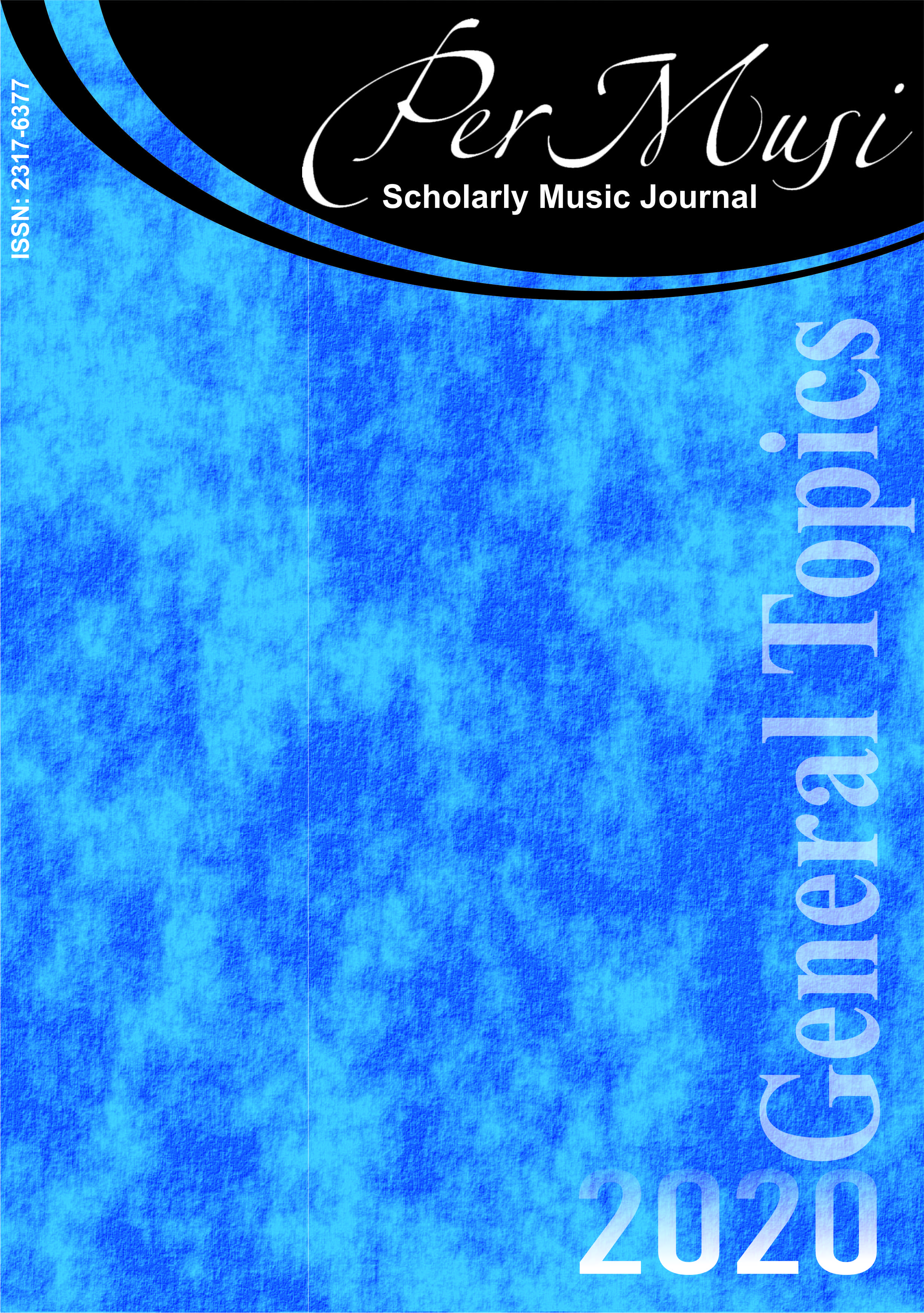A Dádiva na biografia dos professores de música
Uma análise Maussiana da formação da docência em Portugal e no Brasil
DOI:
https://doi.org/10.35699/2317-6377.2020.22038Palavras-chave:
Profissionalização docente em música, Saberes experienciais, DádivaResumo
Esse estudo buscou compreender de que forma o contexto sociocultural e socioeconômico incide/interfere/modifica o processo de formação dos docentes de música que participaram nesta pesquisa, à luz da perspetiva da dádiva, em Marcel Mauss. Seguindo uma metodologia qualitativa, optou-se pelas entrevistas narrativas, por ser um método dinâmico nas investigações que se pautam a partir da prática pedagógica de educadores. Como resultado deste estudo alcançamos que existem diferentes dimensões da formação musical onde os entrevistados defendem uma escuta sensível de seu próprio percurso, concebendo um caminho pedagógico pautado pela alteridade e pela doação.
Referências
Brasil, Anderson. 2019. Música e periferia: o sonho e o real em um mundo negro chamado Bahia. Curitiba: APPRIS.
Abreu, Delmary Vasconcelos de. 2011. Compreender a profissionalização de professores de música: contribuições de abordagens biográficas. Opus 17, no. 2: 141-162.
Amado, João. 2013. Manual de investigação qualitativa em educação. Coimbra: Imprensa da Universidade de Coimbra.
Arendt, Hannah. 2011. “A crise na educação”. In Entre o passado e o futuro, Hannah Arendt, 221-247. São Paulo: Perspectiva.
Brandão, Carlos Rodrigues. 1983. Casa de escola: cultura camponesa e educação rural. Campinas: Papirus.
Benjamin, Walter. 1994. “O narrador”. In Os pensadores, org. Walter Benjamin, Max Horkheimer, Theodor Adorno e Jürgen Habermas, 63-82. São Paulo: Editor Victor Civita.
Biesta, Gert. 2017. Para além da aprendizagem: educação democrática para um futuro humano. Tradução de Rosaura Eichenberg, 1 ed; 1 reimp. Belo Horizonte: Autênica Editora.
Bowman, Wayne. 2010. Action, criticism & theory for music education. Nova Iorque: Cambridge University Press.
Cavaco, Carmen. 2009. “Experiência e Formação experiencial: A especificidade dos adquiridos experienciais”. Educação Unisinos 13, no.3: 220-227.
Clandinin, Jean e Michael Connelly. 2000. Narrative inquiry: Experience and story in qualitative research. San Francisco: Jossey-Bass.
Clandinin, Jean e Michael Connelly. 1990. “Stories of experience and narrative inquiry”. Educational Research 19, no. 5: 2-14.
Delory-Momberger, Christine. 2008. Biografia e educação: Figuras do indivíduo-projeto. Natal: EDUFRN.
Durkheim, Émile e Marcel Mauss. (1901-1902) 2002. De quelques formes de classification - Contribution à l'étude des représentations collectives. Paris: Presses Universitaires de France.
Elliott, David. 1995. Music Matters: A new philosophy of music education. Oxford: Orford University Press.
Jorgensen, Estelle. 1997. In search of music education. Urbana: University of Illinois Press.
Jovchelovitch, Sandra e Martin Bauer. 2002. Pesquisa qualitativa com texto, imagem e som: Um manual prático. Petrópolis: Vozes.
Josso, Marie-Christine. 2006. “As figuras de ligação nos relatos de formação: ligações formadoras, deformadoras e transformadoras”. Educação e Pesquisa 32, no. 2: 373-383.
Mauss, Marcel. 1974. “Ensaio sobre a dádiva. Forma e razão da troca nas sociedades arcaicas”. In Sociologia e antropologia v. 2, Marcel Mauss, 183-314. São Paulo: Edusp.
Nóvoa, António. 1997. Os Professores e sua formação. Lisboa: Publicações Dom Quixote.
______. 1995. “Os Professores e as Histórias da sua Vida”. In Vidas de Professores, org. António Nóvoa, 11- 30. 2.ª ed. Porto: Porto Editora.
Passeggi, Maria da Conceição e Souza, Elizeu Clementino. Org. 2008. (Auto)biografia: Formação, territórios e saberes. Natal: EDUFRN.
Paz, Ana Luísa. 2018. Ser músico em Portugal: Trajetórias do aprender a ser génio, finais do século XIX- inícios do século XX. Porto: SPCE/De Facto.
Portelli, Alessandro. 2004. “O momento da minha vida. As funções do tempo na História Oral”. In Muitas memórias, outras histórias, org. Déa Ribeiro Fenelon et al., 296-313. São Paulo: Olho d’Água.
Simmel, Georg. 2009. Psicologia do dinheiro e outros ensaios. Lisboa: Texto & Grafia.
Swanwick, Keith. 2003. Ensinando música musicalmente. São Paulo: Moderna.
Tardif, Maurice. 2012. Saberes docentes e formação profissional. Petrópolis: Vozes.
Tardif, Maurice e Claude Lessard. 2009. O trabalho docente: Elementos para uma teoria da docência como profissão de interação humana. Tradução de João Batista Kreuch. 3.ª ed. Petrópolis: Vozes.
Vargas, António Pinho. 2011. Música e poder: Para uma sociologia da ausência da música portuguesa no contexto europeu. Coimbra: Almedina.
Downloads
Publicado
Edição
Seção
Licença
Copyright (c) 2021 Per Musi

Este trabalho está licenciado sob uma licença Creative Commons Attribution 4.0 International License.

Exceto onde está indicado, o conteúdo neste site está sob uma Licença Creative Commons - Atribuição 4.0 Internacional.












